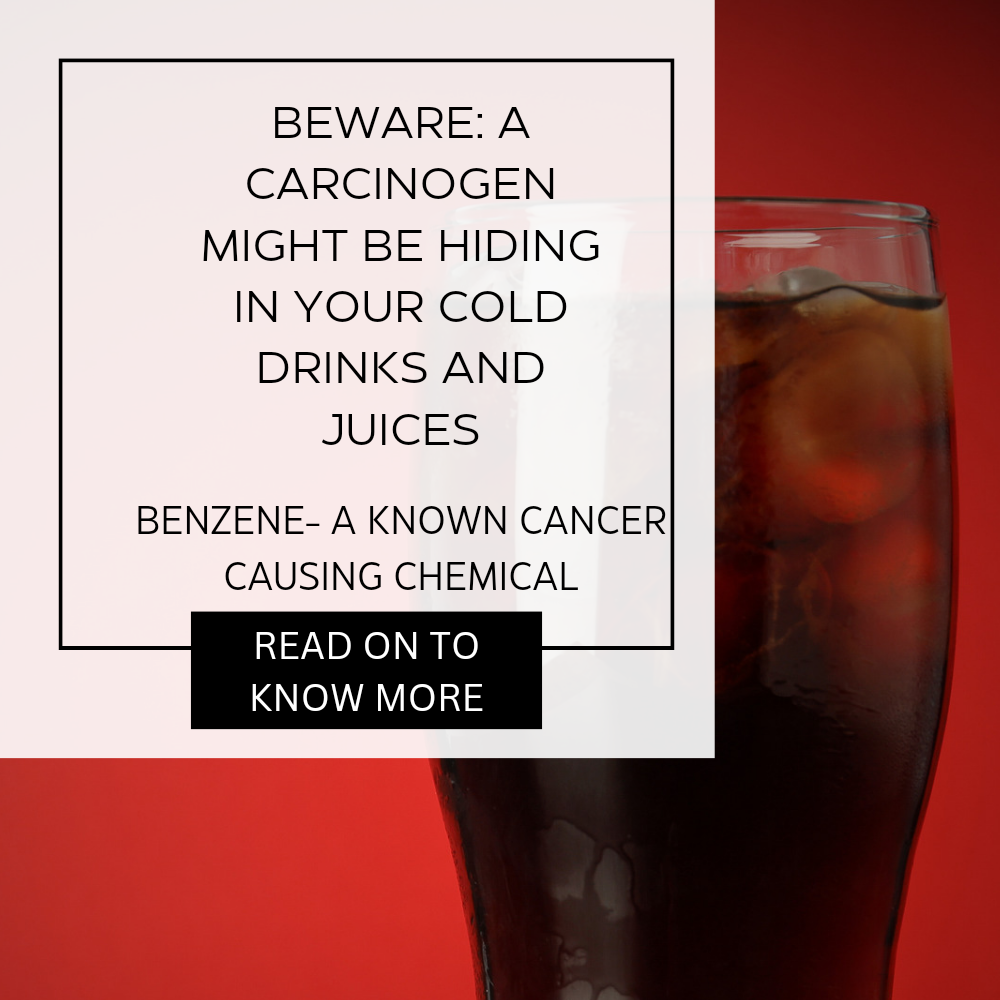
In our modern world, preservatives play a vital role in prolonging the shelf life of various food and beverage products. Sodium benzoate, a commonly used preservative in cold drinks, juices, and pickles, performs this task by inhibiting the growth of bacteria, yeasts, and molds. However, recent scientific studies have raised concerns about the potential carcinogenic effects of sodium benzoate when exposed to certain conditions. In this post, we will shed light on the transformation of sodium benzoate and its possible link to cancer.
𝙐𝙣𝙙𝙚𝙧𝙨𝙩𝙖𝙣𝙙𝙞𝙣𝙜 𝙎𝙤𝙙𝙞𝙪𝙢 𝘽𝙚𝙣𝙯𝙤𝙖𝙩𝙚
Sodium benzoate (E211) is a sodium salt derived from benzoic acid. It is commonly used as a preservative due to its ability to prevent spoilage caused by microorganisms. This compound is considered safe for consumption in low amounts and is approved by regulatory authorities worldwide, including the FDA in the United States.
𝙏𝙧𝙖𝙣𝙨𝙛𝙤𝙧𝙢𝙖𝙩𝙞𝙤𝙣 𝙞𝙣𝙩𝙤 𝙖 𝙋𝙤𝙨𝙨𝙞𝙗𝙡𝙚 𝘾𝙖𝙧𝙘𝙞𝙣𝙤𝙜𝙚𝙣
While sodium benzoate itself is not carcinogenic, an alarming finding has emerged regarding its potential to transform into a harmful substance when paired with specific ingredients. When combined with ascorbic acid (Vitamin C) or citric acid, typically found in fruit juices and soft drinks, sodium benzoate can undergo a chemical reaction called benzene formation.
𝘽𝙚𝙣𝙯𝙚𝙣𝙚: 𝘼 𝙆𝙣𝙤𝙬𝙣 𝘾𝙖𝙧𝙘𝙞𝙣𝙤𝙜𝙚𝙣
Benzene is a well-known carcinogen, meaning it has the potential to cause cancer in humans. It is produced as a result of certain industrial processes and can also be found in small quantities in the environment. Prolonged exposure to high levels of benzene has been linked to various types of cancer, such as leukemia and other blood-related cancers.
𝙁𝙖𝙘𝙩𝙤𝙧𝙨 𝘼𝙛𝙛𝙚𝙘𝙩𝙞𝙣𝙜 𝘽𝙚𝙣𝙯𝙚𝙣𝙚 𝙁𝙤𝙧𝙢𝙖𝙩𝙞𝙤𝙣
The formation of benzene from the combination of sodium benzoate and specific acidic ingredients is a complex process influenced by several factors. The presence of heat, light, and prolonged storage time can all contribute to this chemical transformation. Therefore, the risk of benzene formation is higher in products that contain sodium benzoate, ascorbic acid/citric acid, and are exposed to these contributing factors.
𝙍𝙚𝙜𝙪𝙡𝙖𝙩𝙤𝙧𝙮 𝙈𝙚𝙖𝙨𝙪𝙧𝙚𝙨 𝙖𝙣𝙙 𝘾𝙤𝙣𝙨𝙪𝙢𝙚𝙧 𝙎𝙖𝙛𝙚𝙩𝙮
To protect consumers, regulatory agencies have set maximum limits for benzene in food and beverage products. The World Health Organization (WHO) and the FDA, for instance, have established a guideline maximum benzene concentration in drinking water, while the European Union has set limits for various commercial beverages.
Manufacturers are also taking steps to minimize the risk of benzene formation. They may choose different preservatives or alter processing methods to eliminate or reduce ascorbic acid or citric acid in products containing sodium benzoate.
𝘾𝙤𝙣𝙨𝙪𝙢𝙚𝙧 𝙥𝙧𝙚𝙘𝙖𝙪𝙩𝙞𝙤𝙣𝙨
While the risk of benzene formation due to sodium benzoate consumption is relatively low, it is prudent to take certain precautions:
- Moderation: Consume food and beverages containing sodium benzoate in moderation, maintaining a varied and balanced diet.
- Storage conditions: Follow manufacturer instructions regarding storage temperatures and expiration dates.
- Healthy lifestyle: Adhere to a healthy lifestyle that includes a varied diet rich in fruits, vegetables, and other essential nutrients.
𝘾𝙤𝙣𝙘𝙡𝙪𝙨𝙞𝙤𝙣
Sodium benzoate, a commonly used preservative, has raised concerns due to its potential to transform into benzene, a known carcinogen when exposed to specific conditions. While regulatory measures and manufacturer precautions aim to minimize this risk, it is essential for consumers to be aware of these possibilities. By making informed choices and following sensible consumption habits, we can reduce potential health risks associated with sodium benzoate usage.
There are many preservative free healthier options available in the market. If you want to try our range of preservative free natural ferments, click here
If you have more questions about water kefir, read our frequently asked questions here
